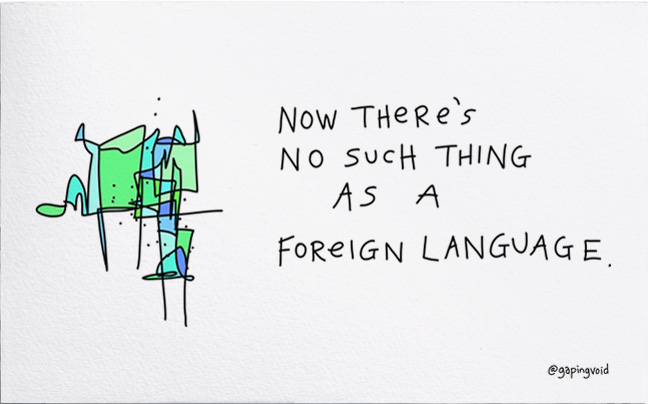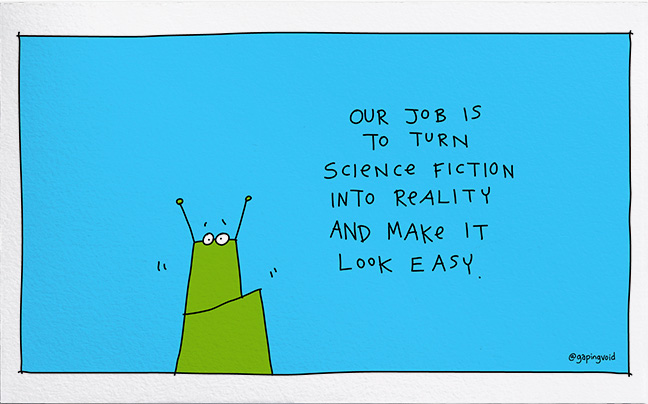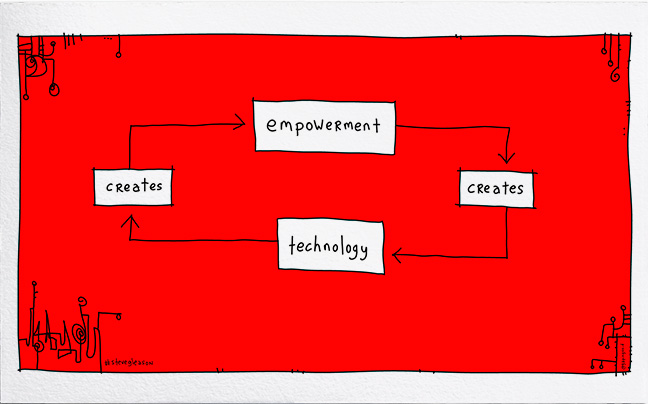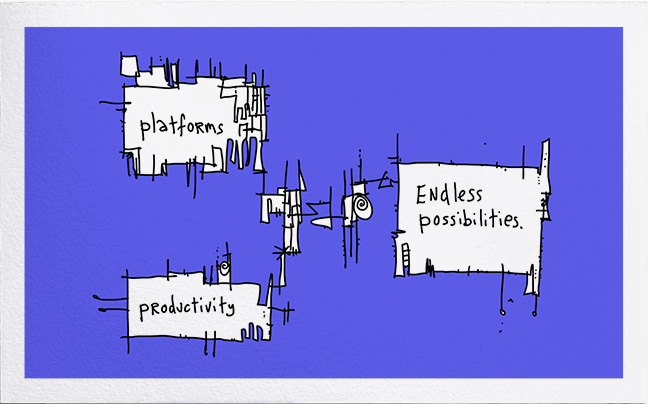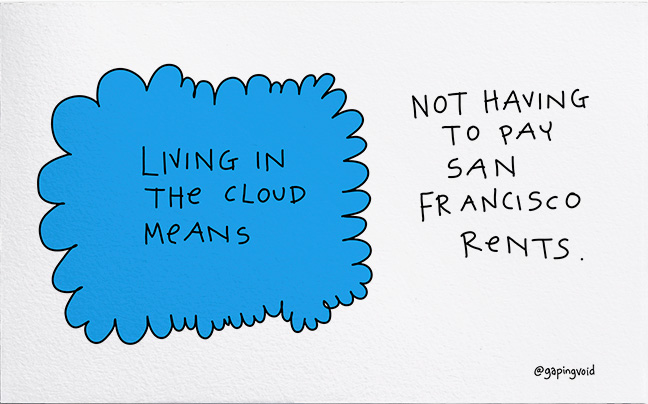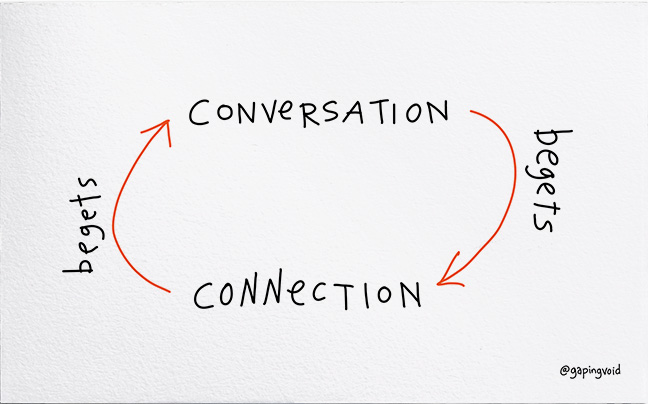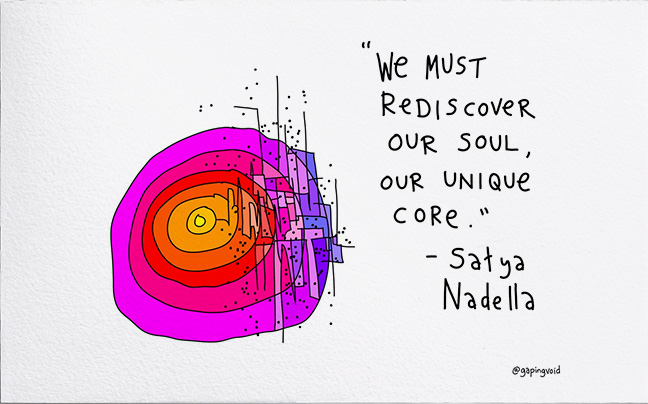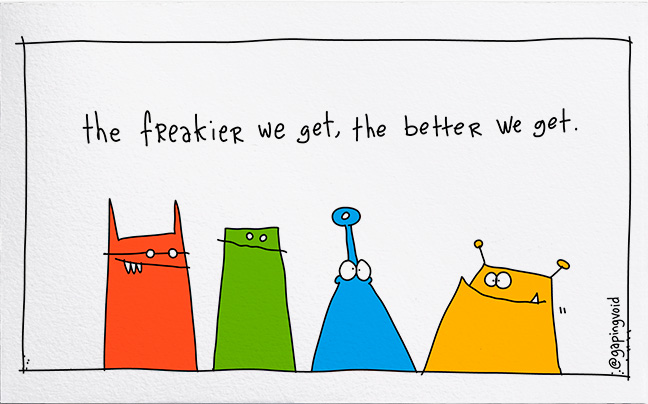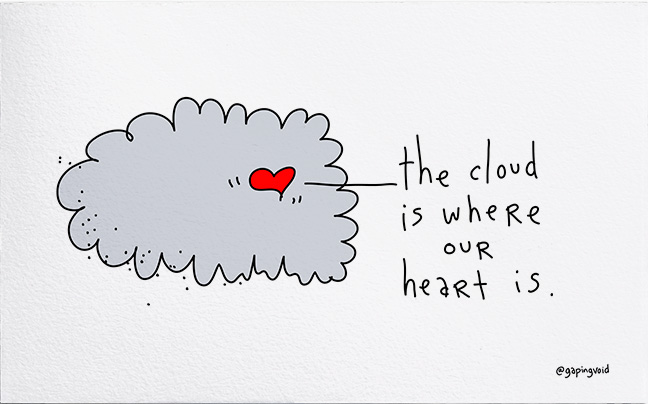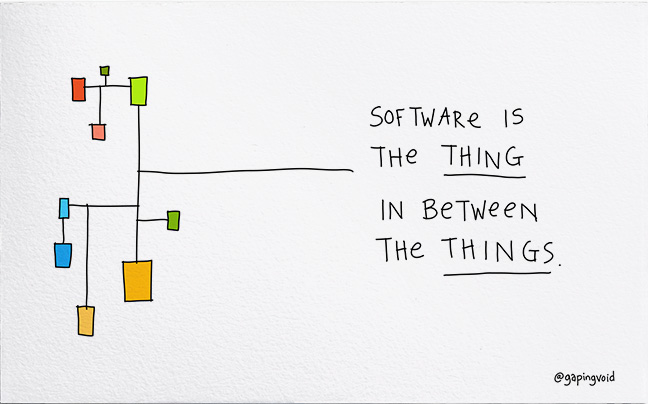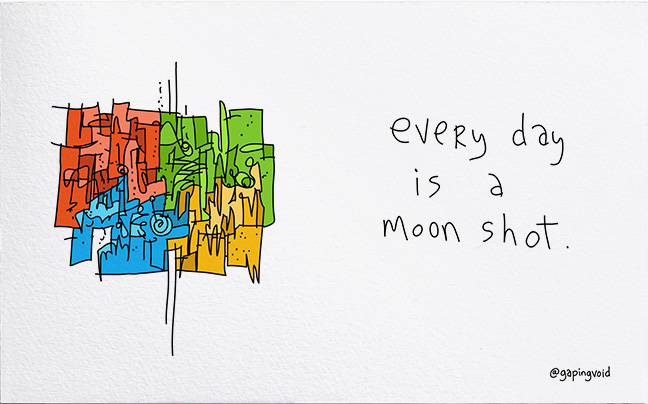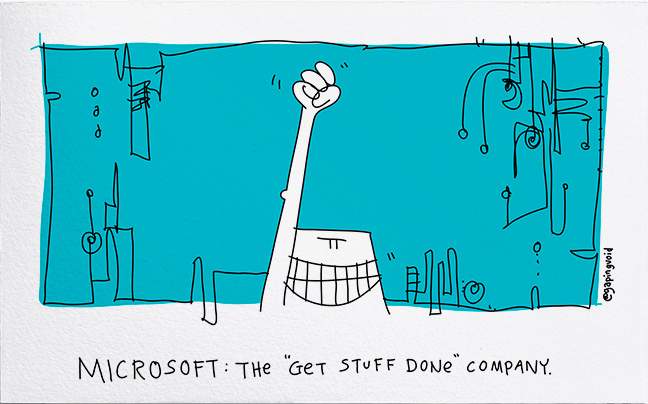-


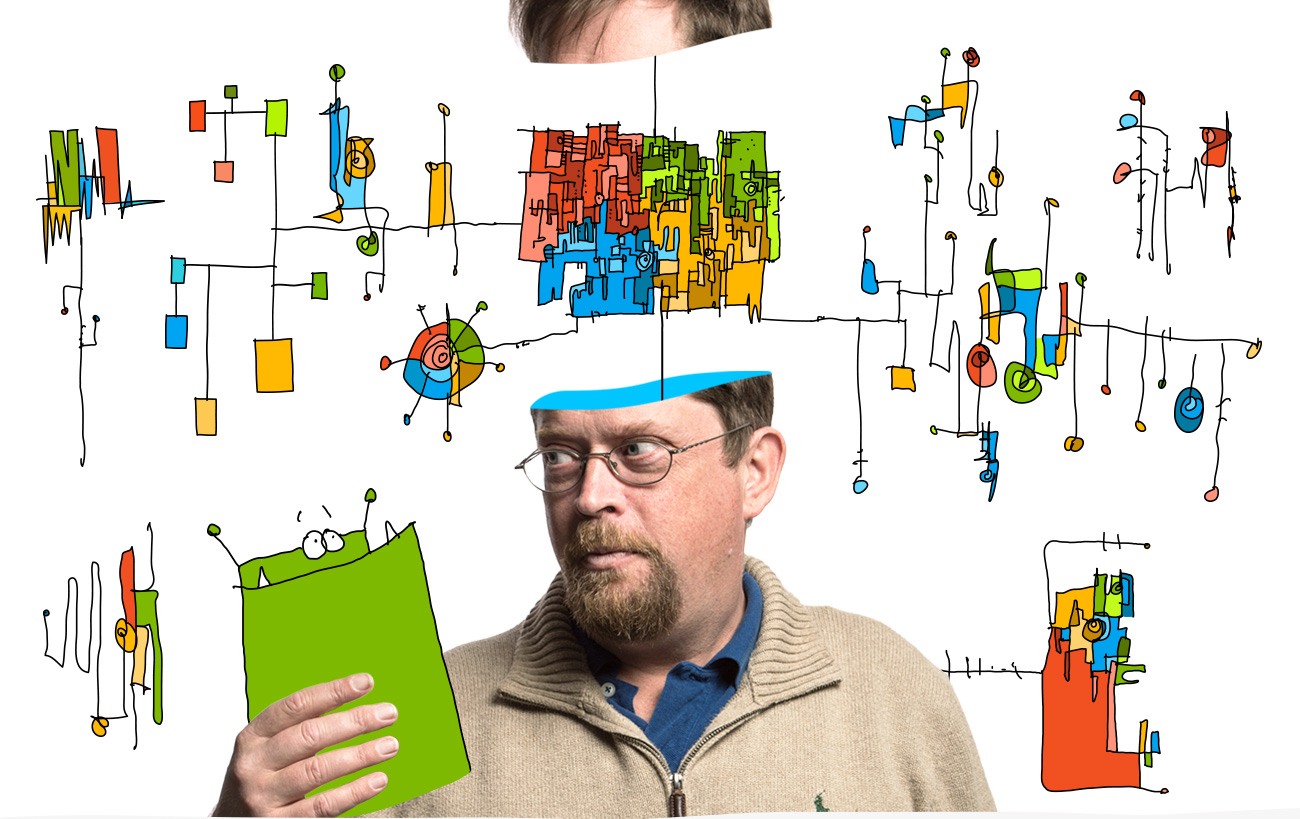
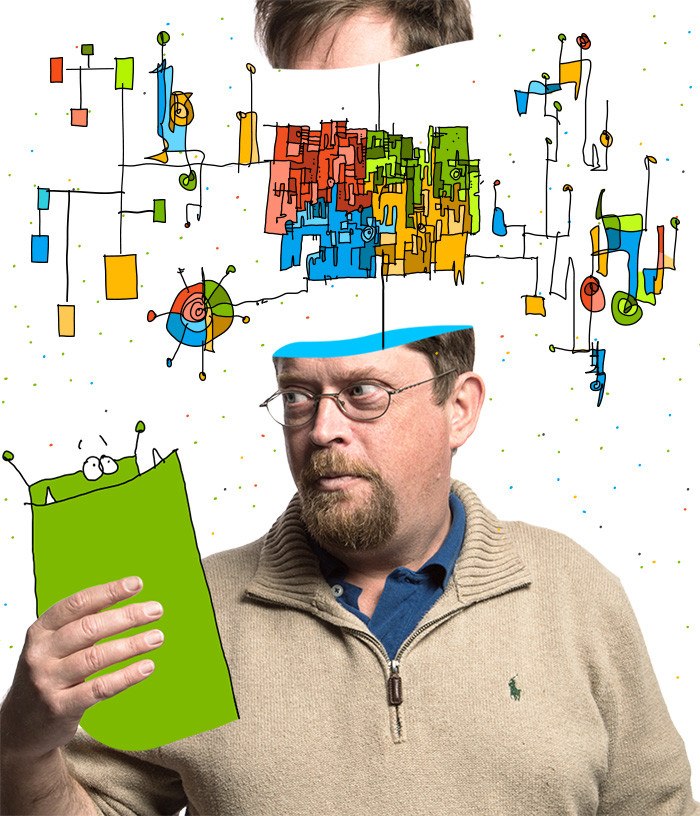
Hugh MacLeod
By Marc Freeman
Connects the Dots Drawing for me is a way of processing thoughts,” said cartoonist Hugh MacLeod. “I use lines to join the dots in my mind.” Those dots he refers to cut to the core of office environments. They help capture, within a drawing, the essence of a company’s aspirations. It’s “motivational art that doesn’t suck,” or so says his company’s website, gapingvoid.com. Prescriptive and inspiring is what pops into my head. You kind of have to be if you’re striving to change the business culture within an organization.
Drawing for me is a way of processing thoughts,” said cartoonist Hugh MacLeod. “I use lines to join the dots in my mind.” Those dots he refers to cut to the core of office environments. They help capture, within a drawing, the essence of a company’s aspirations. It’s “motivational art that doesn’t suck,” or so says his company’s website, gapingvoid.com. Prescriptive and inspiring is what pops into my head. You kind of have to be if you’re striving to change the business culture within an organization.Typically artists and business people operate in different worlds, where never the twain shall meet. MacLeod however is an artist obsessed with the business environment. He provides a right hemisphere brain perspective of the left side. “I find business interesting,” said MacLeod “It’s the art of getting stuff done, of creating something out of nothing. You’re building possibilities.”
Recently, MacLeod has made it his mission to document a moment of major transition at Microsoft’s Redmond campus, where a new CEO and fresh thinking across the company are quietly transforming the 40-year-old organization.
“Attaching art to business outcomes can articulate deep emotions and bring things to light fast,” said MacLeod. To get there requires MacLeod immersing himself within a company, so he can look for what he calls “freaks of light”—epiphanies about a company that express the collected motivations of its people. “My cartoons make connections,” said MacLeod. “I create work in an ambient way to tweak people in the right direction.”
“We had this idea that the right kind of art could lead to the right kind of business outcome.”
Talking to MacLeod, I get the sense that inside he’s floating in a sea of abstractions—about people, the way they operate, and how they do business. Oftentimes, he’ll jump ahead to the next thought before completing the current one. He’s like a master detective in an Agatha Christie novel who switches cases without identifying the murderer. Some might find that maddening, but with his personality and Scottish accent, I find it an endearing quirk.
 Look through his drawings and you’ll see a duality to his edginess and humor. It’s comedic art that oozes attitude, yet requires thought. Right now I have my eyes on a sketch of two offbeat creatures. The caption reads: “The freakier we get, the better we get.” To MacLeod, those words encapsulate the Microsoft story. “Microsoft is super successful BECAUSE of its hardcore freak culture of smart, talented, out-there people, not in spite of it,” he tells me. At the same time, he points out there’s an underlying warning that going forward, the company needs to ensure that no one loses their freak.
Look through his drawings and you’ll see a duality to his edginess and humor. It’s comedic art that oozes attitude, yet requires thought. Right now I have my eyes on a sketch of two offbeat creatures. The caption reads: “The freakier we get, the better we get.” To MacLeod, those words encapsulate the Microsoft story. “Microsoft is super successful BECAUSE of its hardcore freak culture of smart, talented, out-there people, not in spite of it,” he tells me. At the same time, he points out there’s an underlying warning that going forward, the company needs to ensure that no one loses their freak.As a published author, blogger, cartoonist, husband, and father, MacLeod defies labeling, which matches his personality perfectly. Just don’t call him an artist. “Artists make nice pieces,” he admits. “But they spend their day-to-day life in their own head, which isn’t my deal.” So what exactly is his deal then?


He’s an observer and a participant, mingling temporarily within a culture to better understand it. He’s also a listener, taking your thoughts and combining them with his own to piece together the puzzle he is trying to solve about the human condition and business environment. During our conversations, he often turns the table on me, avidly interested in my perspective. I wonder if there’s a nugget of gold in one of my thoughts. Doubtful I conclude, but more power to him if he can convert my gibberish into an inspiring caption.
-
Play Video  MacLeod views Microsoft today as an underdog company, which he feels is an advantage because in the world of technology, it’s better to attack a challenge then defend a position. “I think from my perspective that for many years, Microsoft was maybe too dominant in the market for its own good,” said MacLeod. “Now that this has changed, the company has something worthwhile to aim for, not just something to protect or lose.”
MacLeod views Microsoft today as an underdog company, which he feels is an advantage because in the world of technology, it’s better to attack a challenge then defend a position. “I think from my perspective that for many years, Microsoft was maybe too dominant in the market for its own good,” said MacLeod. “Now that this has changed, the company has something worthwhile to aim for, not just something to protect or lose.”MacLeod aims for truth within his unique perspective. Some of his mindset I presume comes from his worldliness, living the life of a global nomad in places such as England, Scotland, Texas, Chicago, New York City and Miami, his current home. He doesn’t epitomize any of these locales as much as represent a smorgasbord of them all.
“I thought advertising was all about creativity and then I discovered it wasn’t. It was more about being able to get what you want out of a meeting.”
He was born in Massachusetts, in a small town about forty miles west of Boston. Mom was a local whereas Dad was from Scotland, which is where MacLeod went to boarding school and acquired his accent. MacLeod describes those years as grim, due to the school’s “Victorian expectations” that stifled his creativity. He first started sketching during those Dead Poet’s Society years, subversive creative outbursts that were the product more of a wandering mind than a career goal.
While attending college at the University of Texas, he made some cartoons for the school newspaper, which he describes as rubbish, until suddenly one day they weren’t. That realization became his instigator for change. “I decided I’m just going to draw cartoons like nobody else’s,” he recalls. “I’m going to do whatever the hell I want.” By releasing himself of other people’s genius, MacLeod feels he gave himself permission to become good.
However, success takes time. MacLeod’s zig-zag path wasn’t an easy one, to say the least. The zig was living the life of a struggling artist, one who dreams of doing something creative. The zag was the series of advertising gigs he took in different cities in hopes of finding that creative outlet. While he did solve his hand-to-mouth existence, he was left feeling rather soulless. “I thought advertising was all about creativity and then I discovered it wasn’t,” said MacLeod. “It was more about being able to get what you want out of a meeting.”
So he traded the go-go life of marketing for a simple existence as a broke and unemployed ex-patriot living in a scenic small town in England. It was here amidst his quiet surroundings and dwindling savings account that he honed his craft and learned how to market himself through the Internet. “I thought my work was too left of center and would require people saying ‘yes’ and a lot of things out of my control,” said MacLeod. “But if I could reach people through the Internet with my work, I could make a living.”
He started blogging in 2000 because “content is how you generate traffic.” In 2001, he created gapingvoid.com. Gradually he built a large audience, rising to become one of the top 100 blogs in the world by 2004. At the same time, he helped friends start blogs and expand their marketing. In 2009, he wrote his first book as a series of blog posts that he published in a single PDF file. It went viral. This combination of self-marketing and mass marketing provided the impetus for himself and business partner Korman to convert gapingvoid into the services and art consultancy that it is today. “We had this idea that the right kind of art could lead to the right kind of business outcome,” said MacLeod.
These are the types of impact MacLeod makes with his art today, circumnavigating the country to help companies define and improve their business culture. His website calls it business transformation through art. Whatever you call it, it has proven very successful for him.
-
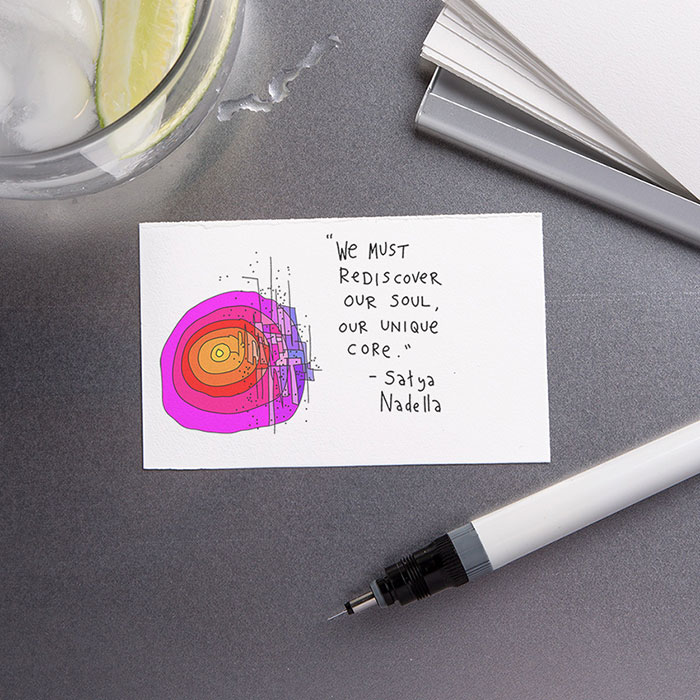
 With Microsoft, MacLeod sees a very different company under Nadella then what existed under long-term CEO Steve Ballmer. The key word is ‘different,’ not better or worse. According to MacLeod, Ballmer’s Microsoft was more product driven and “transactional.” Nadella’s Microsoft is more philosophical. His words are meant as a message of inspiration for everyone here. “Satya is more poetic than software and services,” said MacLeod. “He’s looking at Microsoft providing a way of life, a seamless experience across devices and not any particular product.”
With Microsoft, MacLeod sees a very different company under Nadella then what existed under long-term CEO Steve Ballmer. The key word is ‘different,’ not better or worse. According to MacLeod, Ballmer’s Microsoft was more product driven and “transactional.” Nadella’s Microsoft is more philosophical. His words are meant as a message of inspiration for everyone here. “Satya is more poetic than software and services,” said MacLeod. “He’s looking at Microsoft providing a way of life, a seamless experience across devices and not any particular product.”“The point of Nadella’s vision isn’t to create new stuff for its own sake. It’s about finding ways to make the disparate parts of our lives fit together, as a whole.”
There’s a famous George Carlin riff about how we as people always are looking for a place to put our stuff. Our homes for example, exist so we can store stuff. We move to bigger homes because we have too much stuff. Basically, acquiring and finding places for stuff has become the meaning of our life. In a sense, you could apply that philosophy to technology. That’s why MacLeod is fascinated by Nadella’s take on emphasizing productivity and context. “The point of Nadella’s vision isn’t to create new stuff for its own sake.” said MacLeod. “It’s about finding ways to make the disparate parts of our lives fit together, as a whole.”

To make such a large change in a company’s philosophy takes dedication and thoughtfulness. MacLeod thinks Nadella has done a good job stepping back and reflecting on what Microsoft is as a company and wants to be to the world. “It shows great depth of character to take the time to understand your values and where to invest your resources,” he said. The way MacLeod describes it reminds me of one of those old posters police departments used to leave in my elementary school, instructing children how to cross streets: “Stop. Look. Listen.”
-
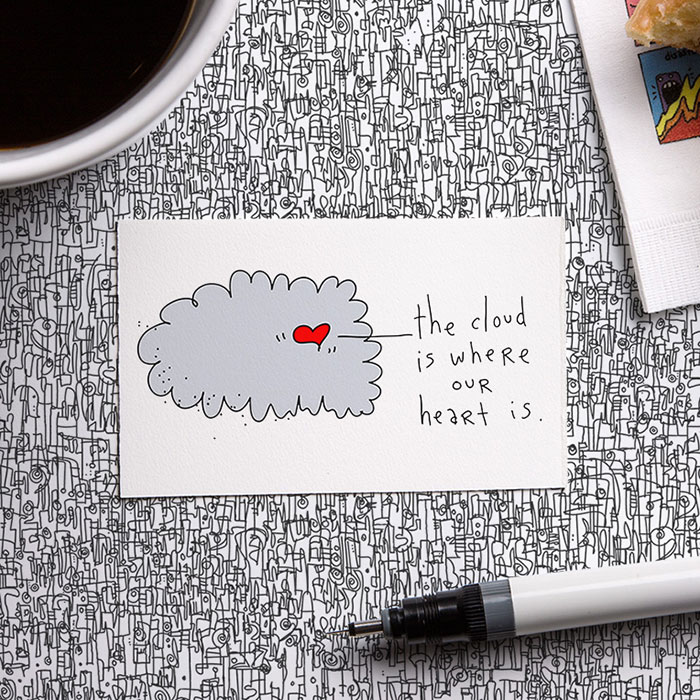
 Microsoft focuses the majority of its resources today on the cloud. MacLeod sees it as the company’s evolution from a desktop entity and the foundation of its future innovation and present inspiration. “The cloud culture and how it redefines the human experience in a meaningful way is at the heart of what the company is and will be moving forward.” said MacLeod. “Everyone here’s using that technology to harness making people’s lives more powerful.”
Microsoft focuses the majority of its resources today on the cloud. MacLeod sees it as the company’s evolution from a desktop entity and the foundation of its future innovation and present inspiration. “The cloud culture and how it redefines the human experience in a meaningful way is at the heart of what the company is and will be moving forward.” said MacLeod. “Everyone here’s using that technology to harness making people’s lives more powerful.”MacLeod also applies that idea to Nadella. “I think Microsoft has an extraordinary culture and he’s going to preserve it,” said MacLeod. “It’s where you all get your mojo.” For him, that success comes less from the products and more from the people behind them and the philosophy that Nadella is driving home. “Great culture doesn’t come from making great products. Great products come from an investment in culture.”

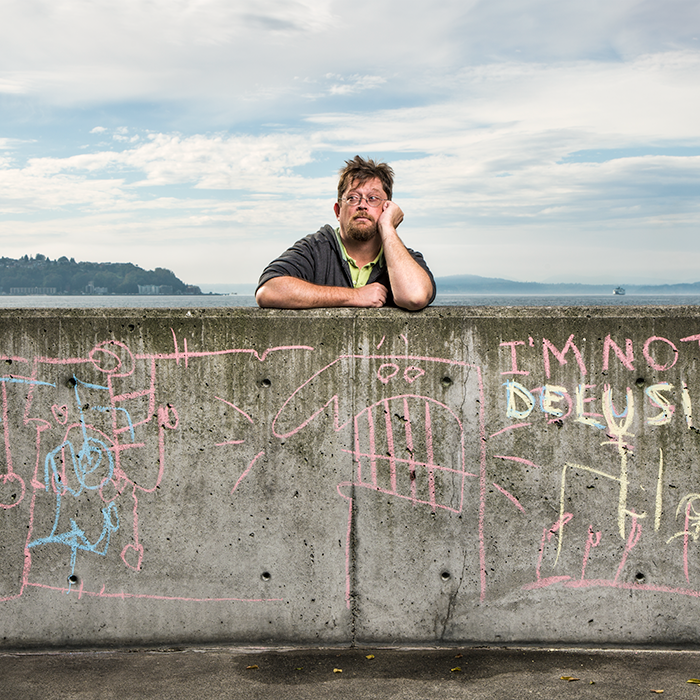
What will MacLeod’s lasting legacy be on Microsoft? He will be stamping a key moment in the company’s timeline where it stopped looking back and focused on moving forward. There is no rearview mirror from MacLeod’s perspective, only a windshield in front with horizons ahead.
“You all have this freaky, obsessive enthusiasm towards technology and what it can do to transform lives,” said MacLeod. “I see a lot of smart people here going crazy over what they do for a living. They’re creating a company that allows them to harness that freakiness in order to create good.”
